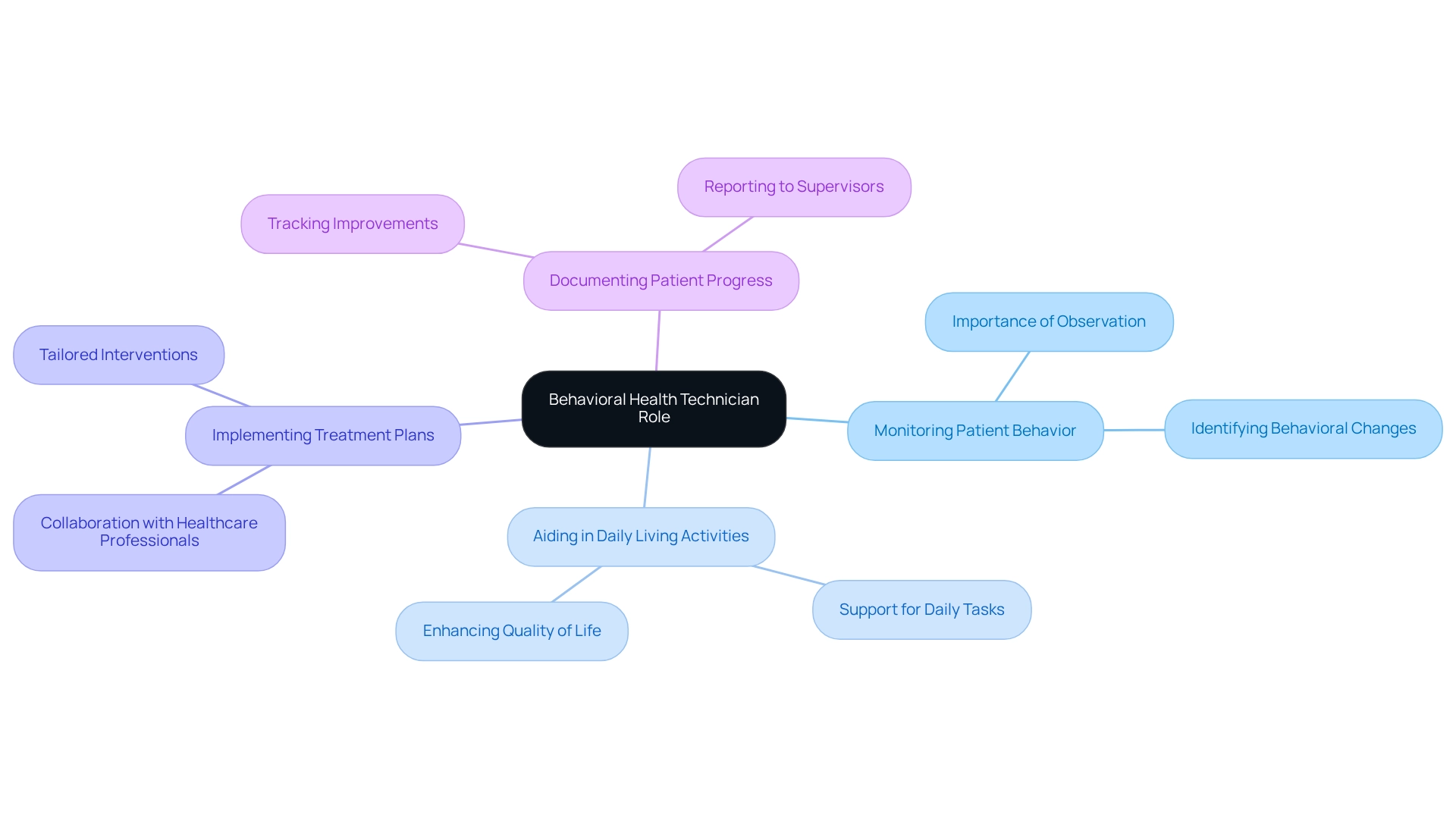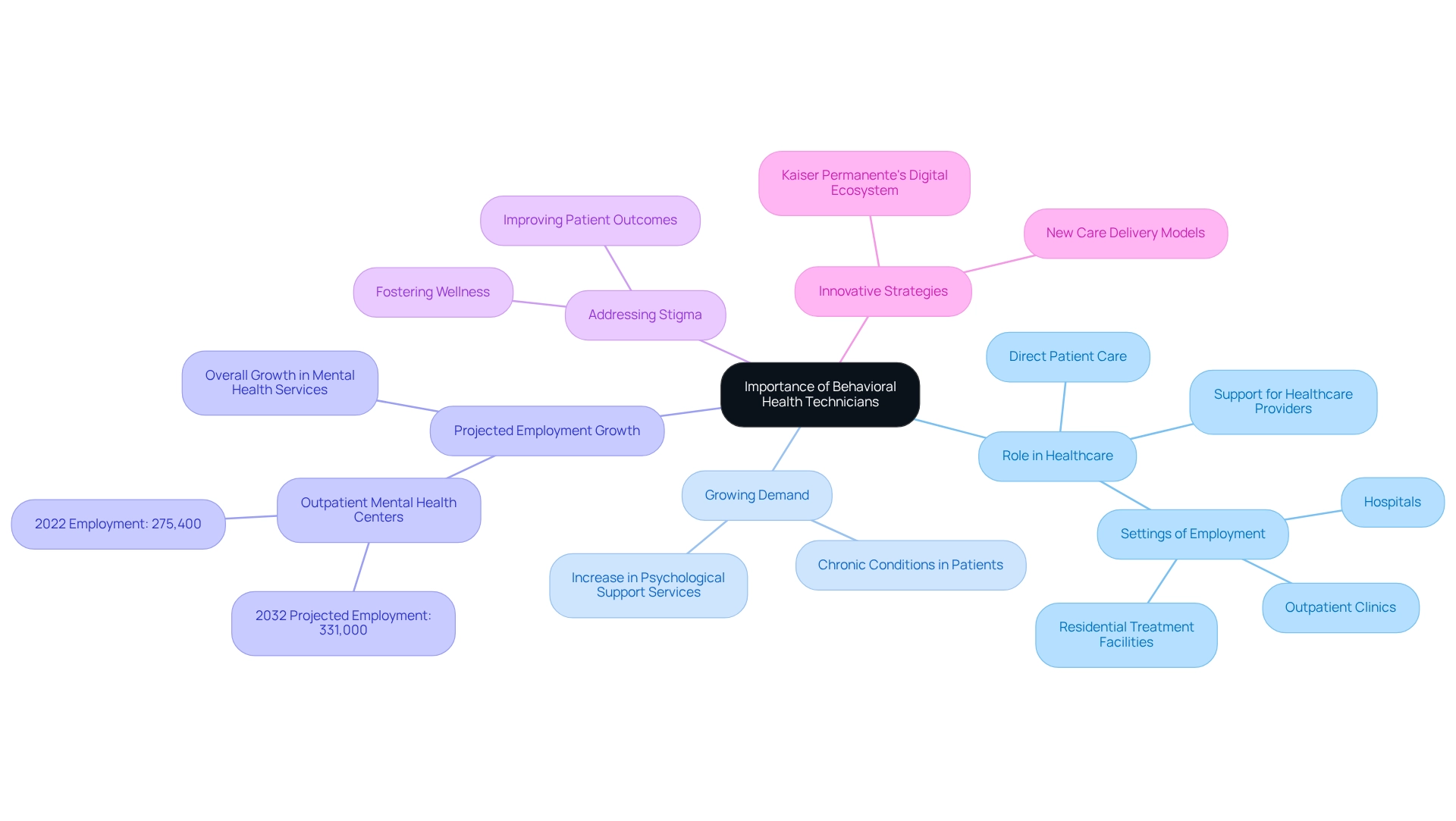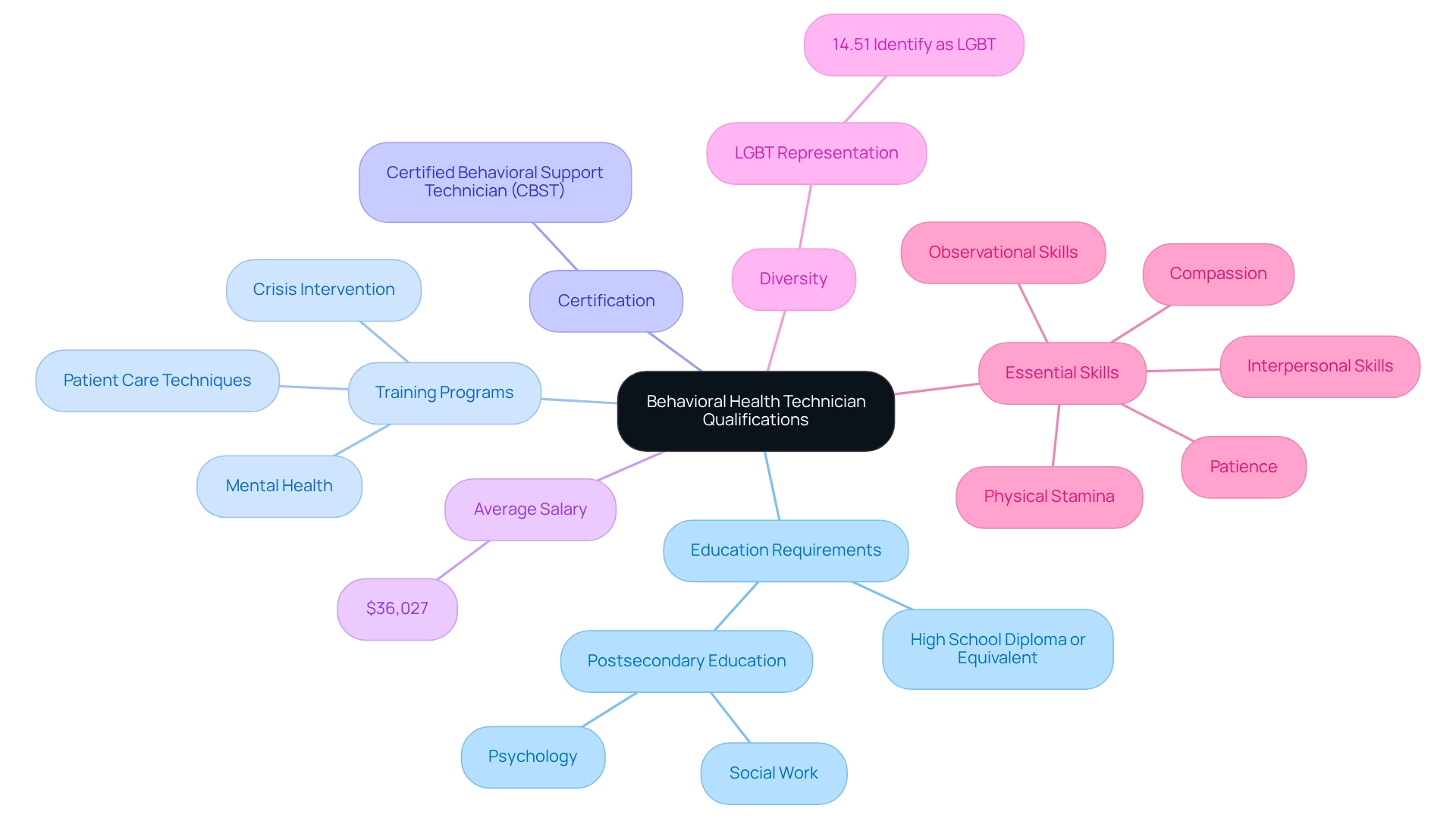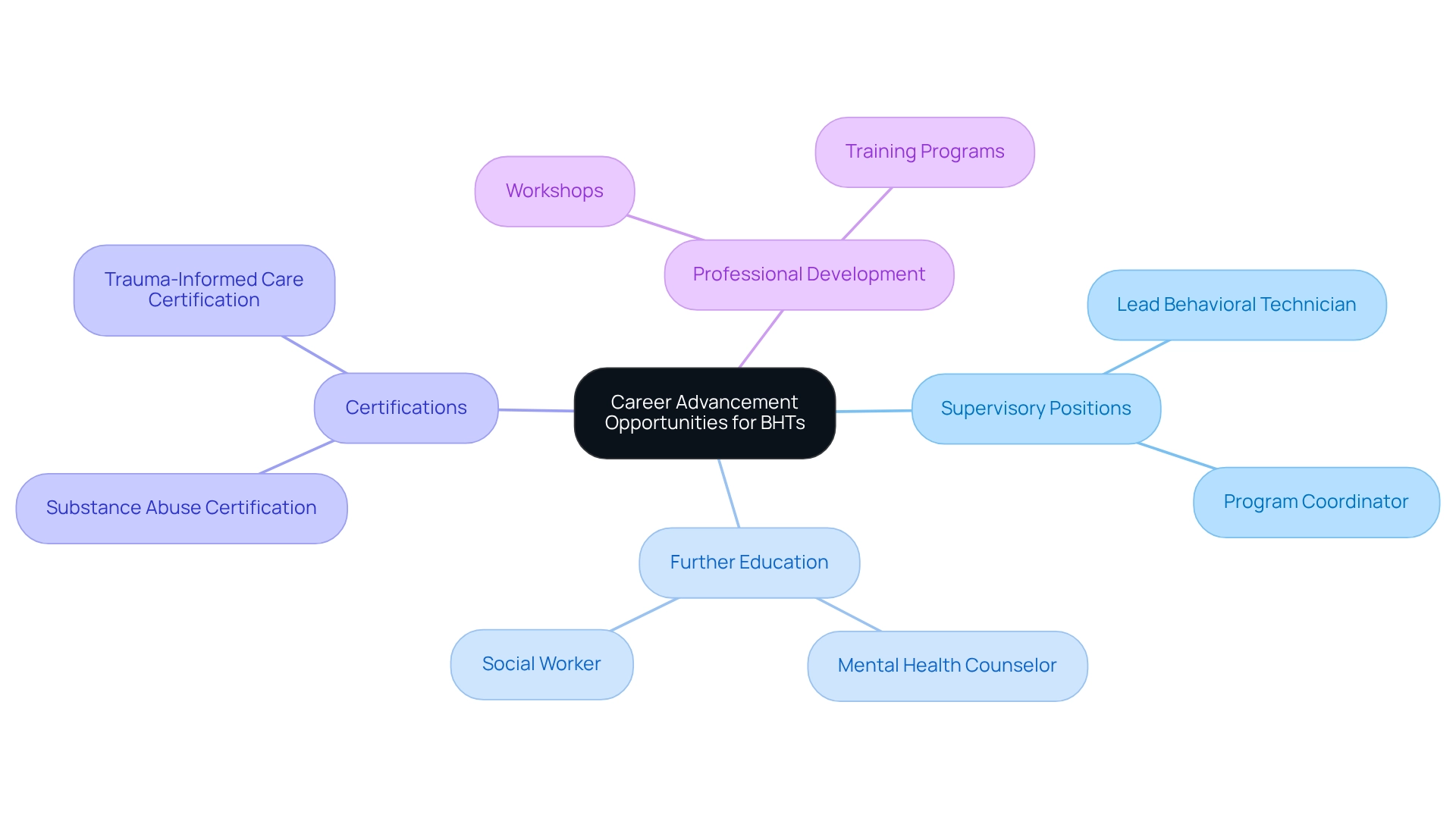May 31, 2025

The article examines the vital role and significance of behavioral health technicians (BHTs) in the healthcare landscape. As the demand for mental health services escalates, BHTs are increasingly acknowledged for their essential responsibilities in delivering direct care to individuals facing psychological challenges. This recognition underscores the importance of their contributions to the healthcare system. Furthermore, pursuing additional education and certifications can unlock substantial career advancement opportunities within this field, making it a compelling path for aspiring professionals.
In light of these factors, how can you leverage this growing demand to enhance your career or recruitment strategies?
In an era where mental health awareness is paramount, Behavioral Health Technicians (BHTs) stand out as essential contributors to the healthcare sector. These committed professionals provide direct support to individuals facing mental health challenges, while significantly enhancing the overall efficiency of mental health services.
The surge in demand for mental health care—exacerbated by the pandemic—has underscored the critical responsibilities and impact of BHTs. From executing treatment plans to facilitating group therapy sessions, their roles are indispensable in creating a nurturing environment that fosters emotional well-being.
This article explores the multifaceted contributions of BHTs, their training and qualifications, and the promising career advancement opportunities available in this fulfilling field.
(BHT) is a skilled expert dedicated to providing direct care and assistance to individuals facing . The 's primary responsibilities include:
Operating under the supervision of licensed healthcare professionals, such as psychologists or psychiatrists, play a crucial role in the therapeutic process, fostering a supportive environment that promotes positive behavior and emotional well-being. This increasing need highlights the necessity for skilled professionals adept in , further solidifying their integral role within the healthcare team. Recent statistics indicate that the hourly pay for behavioral technicians was approximately $14.71 in 2021, reflecting the growing recognition of their contributions to psychological care. However, updated figures for 2025 will provide a clearer picture of their current market value.
Case studies underscore the significant impact of behavioral interventions in psychological settings. For example, organizations like MedCertify offer , including resume building and , enhancing the employability of graduates entering the field. This support ensures that individuals are well-prepared to navigate the job market and secure positions that align with their skills and aspirations. As the landscape of psychological care continues to evolve, the role of behavior health technicians remains vital in and .

(BHTs) are increasingly recognized as vital components of the healthcare team, especially as become more pronounced in society. The demand for is on the rise, with behavior health technicians playing a pivotal role in bridging the gap between patients and healthcare providers. Their presence is indispensable across various settings, including hospitals, outpatient clinics, and residential treatment facilities. By delivering direct care and support, behavior health technicians not only enhance the quality of patient assistance but also improve the overall efficiency of psychological services.
Consider this: outpatient mental wellness and substance abuse centers are projected to expand from 275,400 employees in 2022 to 331,000 by 2032. This statistic underscores for skilled professionals in this field. Furthermore, expert insights indicate that as behavioral wellness patients increasingly present with chronic conditions, the role of behavior health technicians becomes even more critical in addressing these multifaceted needs. Sanjula Jain, Ph.D., emphasizes this shift, stating, "From a system perspective, behavioral wellness is a service line and we are now observing implications that increasingly, behavioral wellness patients seeking treatment will appear different, will be younger, and will present with more chronic conditions."
The contributions of behavior health technicians (BHTs) are essential in combating the stigma surrounding and fostering wellness, ultimately leading to improved and a more effective healthcare system. Additionally, innovative strategies, such as Kaiser Permanente's development of a , highlight the evolving landscape of psychological care and the crucial role behavior health technicians play within such frameworks. As the demand for behavior health technicians continues to grow, it is imperative that recognize the importance of these technicians and invest in recruiting skilled professionals to meet these challenges head-on.

To embark on a career as , candidates generally need a high school diploma or its equivalent. However, many employers prefer applicants with postsecondary education in relevant fields like psychology or social work. typically cover :
These programs equip candidates with the vital skills necessary to excel as a . Certification as a (CBST) or similar qualifications significantly enhances job prospects and demonstrates a strong commitment to the profession. Recent statistics indicate a rising trend in certification rates for Behavioral Support Technicians, reflecting an in this field.
Moreover, the hovers around $36,027, providing healthcare employers with insights into compensation expectations. Practical experience is equally crucial; internships or volunteer roles in mental health settings offer invaluable hands-on training and exposure to real-world scenarios. Notably, a recent analysis revealed that 14.51% of Behavioral Support Technicians identify as members of the LGBT community, highlighting the diverse representation within the profession.
This diversity, combined with essential qualifications—such as —underscores the multifaceted nature of the and highlights the necessity of comprehensive training programs to adequately prepare candidates. As Terry R. Tinsley, PhD, LPC, LMFT, CSOTP, asserts, 'The qualifications and training of Behavioral Technicians are critical to ensuring quality care for patients, particularly those with severe developmental disabilities.

(BHTs) have numerous pathways for , making this a compelling field for those seeking growth. With experience, they can progress into :
In these roles, they supervise staff and manage treatment programs. Pursuing further education, such as a bachelor's degree in psychology or social work, can facilitate entry into roles like:
Notably, obtaining substance abuse or trauma-informed care significantly enhances a and marketability. not only increases responsibilities but also correlates with .
Consider this: only 0.27% of BHT positions require a college degree, indicating a substantial opportunity for those willing to pursue further education. Furthermore, exposure to traumatic client experiences is common in this field, necessitating strong coping mechanisms and supervisory support to navigate these challenges effectively.
support individuals with co-occurring substance use disorders through integrated treatment models, underscoring their within a multidisciplinary team. Case studies illustrate that effective teamwork among BHTs, nurses, therapists, and social workers leads to improved client care and a supportive work environment. This further emphasizes the value of collaboration in advancing one’s career in this field.
Are you ready to explore the opportunities that lie ahead in behavioral wellness?

The role of Behavioral Health Technicians (BHTs) is increasingly vital in the landscape of mental health care, particularly as the demand for support rises amid ongoing societal challenges. BHTs not only provide essential direct care and support to individuals facing mental health and developmental issues, but they also significantly enhance the efficiency of healthcare services. Their responsibilities—ranging from implementing treatment plans to facilitating group therapy—are critical in fostering environments that promote emotional well-being.
As the field continues to evolve, the training and qualifications necessary for BHTs are paramount. With a focus on practical experience and specialized certifications, these professionals are well-equipped to meet the complex needs of patients. The growing emphasis on formal education and certification reflects a broader recognition of the importance of BHTs in delivering quality mental health care.
Career advancement opportunities abound for BHTs, allowing them to transition into higher roles and expand their impact within the healthcare system. By pursuing further education and specialized training, BHTs can enhance their qualifications and contribute even more effectively to patient care. The collaborative nature of their work, particularly in integrated treatment settings, underscores the importance of teamwork in achieving positive patient outcomes.
In summary, Behavioral Health Technicians play an indispensable role in addressing mental health challenges, and their contributions are critical to the future of healthcare. As awareness of mental health issues continues to grow, so too does the opportunity for BHTs to make a lasting impact in the lives of individuals and the broader community. The dedication and skill of these professionals are essential to fostering a supportive and effective mental health care environment.
What is a behavior health technician (BHT)?
A behavior health technician (BHT) is a skilled expert who provides direct care and assistance to individuals facing psychological challenges or developmental disabilities.
What are the primary responsibilities of a behavior health technician?
The primary responsibilities of a behavior health technician include monitoring patient behavior, aiding in daily living activities, implementing treatment plans, and meticulously documenting patient progress.
Who supervises behavior health technicians?
Behavior health technicians operate under the supervision of licensed healthcare professionals, such as psychologists or psychiatrists.
What role do behavior health technicians play in the therapeutic process?
Behavior health technicians play a crucial role in fostering a supportive environment that promotes positive behavior and emotional well-being.
What is the hourly pay for behavioral technicians as of 2021?
The hourly pay for behavioral technicians was approximately $14.71 in 2021.
Why is there a growing need for behavior health technicians?
There is an increasing need for skilled professionals adept in crisis intervention and group therapy facilitation, which solidifies their integral role within the healthcare team.
How do organizations like MedCertify support graduates entering the field?
Organizations like MedCertify offer comprehensive career support services, including resume building and job placement assistance, enhancing the employability of graduates.
What is the significance of behavioral interventions in psychological settings?
Case studies underscore the significant impact of behavioral interventions in psychological settings, highlighting their importance in addressing patient needs and supporting the overall medical system.
Our expert recruitment strategies and AI-driven sourcing ensure that you receive top-notch candidates quickly, without compromising on quality. Whether you’re looking for BCBAs, Clinical Directors, or RBTs, we’ve got you covered.